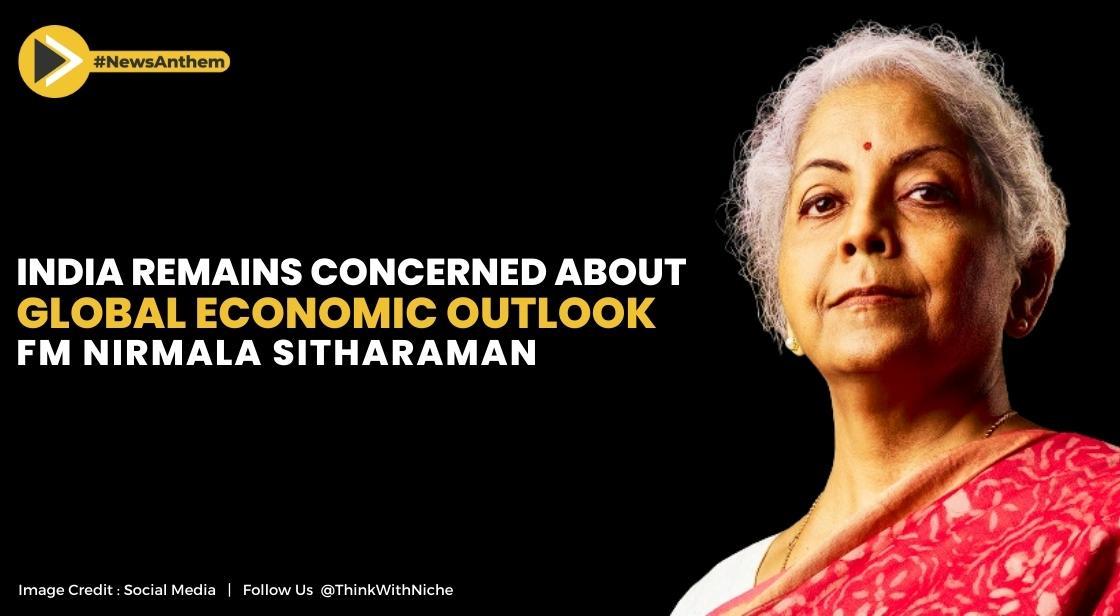India Remains Concerned About Global Economic Outlook: FM Nirmala Sitharaman

News Synopsis
On Wednesday, at the annual meetings of the International Monetary Fund (IMF) and the World Bank, she remarked at the 107th meeting of the Development Committee.
Continued disruptions to global supply chains are still straining food, fuel, and fertilizer supplies, and endangering food and energy security. The minister stated that this has a disproportionately negative impact on the poor, the weak, and the marginalized, particularly in developing countries.
The Union minister Nirmala Sitharaman stated that"The need of the hour is a people-centric, equity-driven, consensus-based, and collective approach to face global developmental challenges,"
According to her remarks to the "Development Committee," these conditions present a greater challenge to multilateralism than ever before. She also stated that in light of the WBG's 'Evolution Road Map' discussion, "we encourage the World Bank Group (WBG) to evolve into a bigger and better bank, which is 'fit for purpose' to address the new world challenges".
She urged all shareholders and stakeholders to develop a creative, audacious, and strong strategy to turn the WBG into an organization that is capable of successfully handling both current and upcoming difficulties during her speech.
We anticipate a WBG that uses creative resource mobilization strategies, realizes its full potential as a knowledge and solution bank, and fully utilizes its comparative advantage to create a better world. stated Sitharaman.
In spite of obstacles and global headwinds, India is expected to see economic growth of more than 6%, making it the only major country rising at that rate, Sitharaman told the "Development Committee."
"With a manageable current account deficit and a growth rate highest among the major economies in the financial year 2023, the Indian economy has shown resilience in navigating the turbulence of the (Covid) pandemic as well as geopolitical spill-over," she added.
As indicated by expected GDP growth of 9.1% for the last fiscal year, the minister said that an upbeat business climate, high industrial production, and quick vaccine coverage against Covid had supplied a strong impetus to the Indian economy.
In FY22–23, India staged a complete recovery, outpacing many other nations, and put itself on an upward pre–pandemic economic path, according to her.
In addition to ensuring a speedy economic rebound, the unmatched (anti-Covid) immunization campaign has also guaranteed economic prospects for the rest of this year and beyond. The boost for medium-term growth has been supplied by the successful implementation of the labor and agricultural reforms, according to the minister.
According to Sitharaman, India's "Long-Term Low-Carbon Development Strategy" envisions switching to a low-carbon growth path that will cost money for the creation of new infrastructure, the deployment of new technologies, and other transaction costs.
In accordance with India's climate objectives, she noted, the Union Budget has also promoted energy transition by supporting local manufacture of solar power equipment and batteries.
According to Sitharaman, the WBG should continue to concentrate on its mission of 'Ending Extreme Poverty' and 'Promoting Shared Prosperity' as well as its vision of a 'World Free of Poverty'.
This being said, she stressed the importance of making sure the twin goals are accomplished in a way that is inclusive in order to benefit everyone, resilient in order to protect them from developmental shocks, and sustainable from a social, economic, and environmental perspective in order to ensure the welfare of future generations.
"While we concur that climate change, pandemic and fragility are global challenges, it is also important to focus on other global development challenges such as food insecurity, water and energy access and affordability, digitalization and debt sustainability," the minister stated.
Reaching an agreement on the categories of global development concerns and "develop selectivity criteria that is consistent with the WBG's mandate and its comparative advantage". are therefore vital given the constrained scope of available resources, according to Sitharaman.
You May Like









